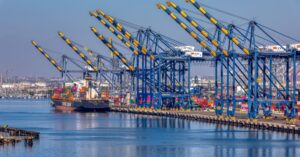Oh the complexities of freight shipping these days! From the fluctuating cost of transportation to unexpected delays, ongoing disruptions, and unforgiving schedules that demand satisfaction, shippers are challenged daily as they grapple with a variety of issues.
Even major corporations with deep pockets and dedicated transportation departments find themselves up against the headwinds of geopolitical tensions, labor disputes, capacity restraints, and severe weather that causes cargo loss.
That’s where the resources of a tech-savvy, proactive freight broker can turn these challenges into manageable, even advantageous, aspects of shipping strategy. In essence, a freight broker acts as a middleman, connecting shippers with carriers and providing value to both parties.
A Closer Look at Freight Risks (And How To Outsmart Them)
Given all these complexities facing shippers, how can a qualified freight broker help them navigate challenges, mitigate risk, and resolve issues? As it turns out, in lots of ways, as we detail below:
Freight Damage
For starters, freight goes on a rough ride – literally. Its journey is full of bumps and jolts in handling and transport, loading and unloading. While it may not be as bad as this guy, freight handling involves a good deal of jostling. It’s handed off from initial pickup by truck for direct or rail transit to a port, then onto the plane or cargo ship, off at the other end, to a container yard (or freight station for breakdown if it’s going LCL), and finally onto whatever mode represents the last leg.
Cargo Theft
Cargo theft is a growing problem. Overhaul, an Austin, TX-based supply chain risk management company, reported that there were 500 cargo thefts in the United States in the third quarter of 2024, up 6.2% from Q2. The average loss per theft was estimated at $176,290. Electronics represented the largest category, at 30% of all incidents, with California the location of nearly half of the thefts – not surprising, considering the volume in and out of LA/Long Beach.
Container Loss
Container loss at sea is another issue. The World Shipping Council estimates that an average of 1,500 containers have been lost annually since 2008, when they first started tracking incidents. Newsweek reports that experts believe the actual number to be higher as WSC data doesn’t cover the entire industry, and penalties aren’t imposed for failure to report losses.
Freight Damage Claims
Managing freight damage claims is a very involved process that begins with a prompt inspection of goods upon arrival and thorough documentation of any damage with photos and detailed descriptions. Shippers must then notify the carrier immediately, file a claim, and maintain all supporting documents (bill of lading, invoice, proof of delivery, etc.). There is also active follow-up with the carrier to negotiate a settlement.
Regulatory Compliance
Regulatory requirements for freight shipping can feel like a minefield, especially for international shipments. In the U.S., carriers and fleet managers must adhere to driver hours of service (HOS) requirements from the FMCSA; OSHA safety standards for drivers and material handlers; hazmat and pharmaceutical handling requirements from the DOT and FDA, respectively; and carbon emission standards from the EPA and state environmental authorities.
The regulatory burden is much more involved with international freight. There are customs declarations and documentation, Incoterms compliance detailing buyer and seller responsibilities, security and antiterrorism regulations, environmental and emission standards, export controls, tariffs and quotas, Harmonized System (HS) classification for tariff calculation and customs clearance, and penalties for misdeclaration of freight valuation.
How Freight Brokers Can Help
In all these situations, the services of a trusted freight broker come into play and prove valuable. The right broker can help guard against freight damage risk by selecting only vetted carriers, advising shippers on using resilient packaging, and pointing toward suitable cargo insurance based on the value of goods and your risk profile.
Freight brokers can mitigate cargo theft and container loss through a combination of security practices, technology, risk management, education, and vetting carriers. This includes:
- Advising on route selection (avoiding high-theft lanes and locations)
- Arranging for daytime pickups and deliveries
- Avoiding overnights at rest stops
- Using GPS and geofencing to detect route deviation
- Vetting secured logistics facilities
- Training on anti-theft practices (securing and sealing containers)
- Conducting risk assessment
- Advising on specialized insurance
- Helping formulate rapid response plans in case of theft.
With claims, the right freight broker can guide shippers through the filing process, including knowing all the required documentation, acting as a go-between with the carrier, following up on claim status, pushing for timely responses, and keeping shippers informed, advising on carrier liability limits, filing deadlines, and best practices; and leveraging established carrier relationships when acting as a shipper’s advocate.
An experienced freight broker stays on top of the latest compliance standards, helping shippers avoid costly fines and delays by providing expert guidance and helping streamline documentation and paperwork. Tech-savvy brokers also use digital tools that automate compliance checks, document filing, and regulatory updates. This includes tracking shipment status, flagging potential compliance issues, and even pre-filling required forms, saving time and reducing errors.
Tech-Enabled Tools for Staying Ahead of the Game
A freight broker that combines the latest technology and tools with a deep understanding of the logistics industry can help shippers mitigate risk and ensure safe, on-time delivery of their goods.
Eyes on Every Mile: Real-Time Tracking as Your Security Partner
Theft and loss are critical concerns, particularly with high-value goods, and real-time tracking offers a powerful security layer. A tech-savvy broker can provide advanced tracking tools that give shippers real-time visibility into every stage and touchpoint. With access to live location updates, they can detect deviations, address delays, and respond immediately to unexpected events or security threats. This level of vigilance can significantly reduce risks and improve operational control.
Forecasting the Unpredictable: Using Data to Tackle Cost Volatility
Freight rates are inherently volatile, influenced by fuel prices, seasonal demand, and economic conditions. This will especially be true in the turbulence of the post-election period, where ocean freight volumes are spiking in anticipation of stiff tariffs from the Trump administration.
A data-driven broker uses analytics to predict trends, giving shippers a strategic edge. Forecasting potential rate hikes enables shippers to lock in favorable rates, plan for price shifts, and adjust strategies accordingly. This saves on costs and helps ensure budget predictability.
Building Flexibility: Strategies for Dealing with Disruptions
Speaking of the current spike in ocean freight volume, the law of supply and demand still works extremely well. Any limit in capacity inevitably leads to higher rates – and possibly unpredictable service as space tightens up.
A freight broker can leverage their large network and industry relationships to secure priority service, ensuring reliable shipping even when capacity is tight.
Weathering the Storm: Contingency Planning for Nature’s Impact
Hurricanes, snowstorms, and floods don’t follow shipping schedules, yet they can bring them to a halt. Recently, extreme drought conditions at the Panama Canal severely limited passage through the major east-west passageway, causing significant delays and increased shipping costs. Fortunately, traffic through the canal is now on the rebound after the driest year on record and a 29% drop in vessel traffic.
Freight brokers plan ahead with advanced weather monitoring, proactive creation of backup routes, and flexible options. This helps shippers maintain air and ocean freight operations and keep to their schedules in the face of nature’s unpredictability.
Safeguarding Digital Borders: Cybersecurity in the Freight World
As logistics become increasingly digital, cybersecurity threats increase, with data breaches potentially exposing sensitive shipment details to malicious actors, causing costly disruptions.
Tech-savvy freight brokers play a key role in guarding against this risk by implementing robust cybersecurity protocols to protect shippers’ data. From encryption and multi-factor authentication to secure data-sharing systems, these measures ensure that information remains safe throughout every step of the shipping process, from booking to delivery. This proactive approach helps shippers mitigate risks, maintain confidentiality, and ensure secure freight operations.
Staying Agile in a Changing Landscape
Labor disruptions, from port strikes to driver shortages, can slow down or even halt your supply chain. For instance, labor peace is far from settled at East Coast and Gulf Coast ports. The ILA, representing dockworkers, walked away from contract talks with USMX in mid-November, just two days into negotiations, according to Seatrade Maritime News. The growing use of automation by port and terminal operators and its impact on job security remains the sticking point.
Freight brokers stay updated on labor conditions and maintain an active roster of alternative routes, carriers, and port options to help shippers adjust swiftly when inevitable workforce issues arise.
Freight Shippers: Button Up Your Risk Management
As has become apparent, complexity and disruption have become the norm in global logistics and transportation. The pandemic lockdowns exposed glaring flaws, and the industry has been scrambling to apply fixes even as new challenges arise. By aligning with a tech-savvy, proactive freight broker, shippers can transform risks into opportunities for cost savings, efficiency, and resilience.
COGISTICS Transportation, a provider of 3PL solutions with a 30-year-plus legacy, offers shippers personalized treatment 24/7/365, anywhere on the globe. Our top-flight expedited freight services, backed by a collaborative communication platform, consistently provide timely, secure, and efficient deliveries. Each shipment is tracked from order to delivery and our customers are informed throughout the entire journey.
Beyond that, COGISTICS Transportation’s broad carrier network, deep industry relationships, and market expertise help ensure solid contingency plans and risk mitigation. The result is dependable service across land, air, and ocean freight operations, even when capacity is constrained. If your freight is extremely time-sensitive, COGISTICS’s expedited freight steps up with cost-effective solutions for rapid shipment. To learn more about how your company can benefit from COGISTICS’s melding of technology, industry savvy, and a high-touch, personalized approach, get in touch with us today.




